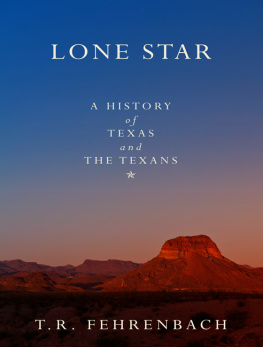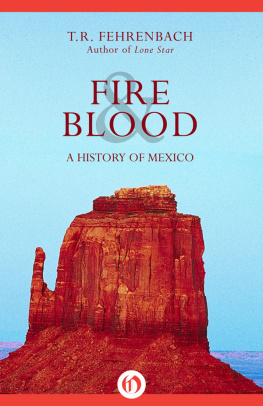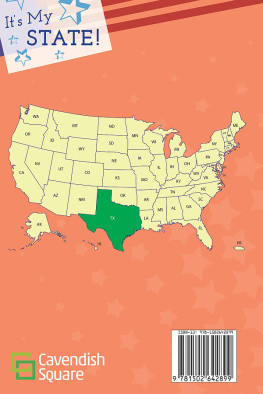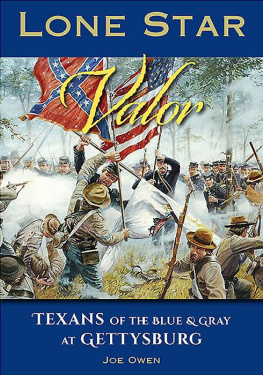T. R. Fehrenbach - Lone Star. A History of Texas and the Texans
Here you can read online T. R. Fehrenbach - Lone Star. A History of Texas and the Texans full text of the book (entire story) in english for free. Download pdf and epub, get meaning, cover and reviews about this ebook. year: 2000, publisher: Da Capo Press, genre: History. Description of the work, (preface) as well as reviews are available. Best literature library LitArk.com created for fans of good reading and offers a wide selection of genres:
Romance novel
Science fiction
Adventure
Detective
Science
History
Home and family
Prose
Art
Politics
Computer
Non-fiction
Religion
Business
Children
Humor
Choose a favorite category and find really read worthwhile books. Enjoy immersion in the world of imagination, feel the emotions of the characters or learn something new for yourself, make an fascinating discovery.
- Book:Lone Star. A History of Texas and the Texans
- Author:
- Publisher:Da Capo Press
- Genre:
- Year:2000
- Rating:5 / 5
- Favourites:Add to favourites
- Your mark:
- 100
- 1
- 2
- 3
- 4
- 5
Lone Star. A History of Texas and the Texans: summary, description and annotation
We offer to read an annotation, description, summary or preface (depends on what the author of the book "Lone Star. A History of Texas and the Texans" wrote himself). If you haven't found the necessary information about the book — write in the comments, we will try to find it.
Lone Star. A History of Texas and the Texans — read online for free the complete book (whole text) full work
Below is the text of the book, divided by pages. System saving the place of the last page read, allows you to conveniently read the book "Lone Star. A History of Texas and the Texans" online for free, without having to search again every time where you left off. Put a bookmark, and you can go to the page where you finished reading at any time.
Font size:
Interval:
Bookmark:
Lone Star:
A History of Texas
And the Texans
T. R. Fehrenbach
Copyright 1968, 2000 by T. R. Fehrenbach
Published by E-Reads
To the memory of my maternal grandfather,
Charles Columbus Wentz:
Born in the worst era of this nation's past,
named for a Negro slave; cotton grower,
cattleman, and latter-day empresario;
he had always courage.
Foreword to the 2000 Edition
Techniques change daily, social mores over decades, but the basic nature of societies changes more slowly, if at all. Change in Texas over the past thirty years has been neither as rapid nor as profound as many predicted (and some would have preferred) in the 1960s. The reasons are logical: The Texan mystique was created by the chemistry of the frontier in the crucible of history and forged into an enduring state of heart and mind. This may not be an entirely rational state, but then there is not much rationality attached to ethnic identity whether Texan, French, or Israeli. Meanwhile, Texas, through the last half of the 20th century, has suffered little "history." There has been enormous growth and a splendid record of economic development, which are not the same thing. This economic infrastructure may endure or crumble, but it will not spawn the trials, myths, and legends that explain the Creation.
This is why so little "good" historical explanation has been written of the 20th centuryand why 19th-century Texas, from the Alamo to trail drives to Spindletop, will still fascinate Texans in future centuries. Records of economic development do not lend themselves to heart-stirring narratives, and history, after all, is not mere facts and figures but the telling of the human story.
As a construct, history is too often revised to match contemporary views. It has been said that each generation must rewrite history in order to understand it. The opposite is true. Moderns revise history to make it palatable, not to understand it. Those who edit "history" to popular taste each decade will never understand the pastneither the horrors nor glories of which the human race is equally capableand for that reason, they will fail to understand themselves. The 1968 Lone Star was in some ways highly original; it was more a panorama of perceptions than a book of facts and figures. At each stage of history, the narrative was largely drawn from contemporary sources. I have seen no reason to change this, which makes the current edition an update, not a revision, from the ephemeral perspectives of the nineties.
T R. Fehrenbach
September 1998
Foreword to the 1968 Edition
THIS book was put together from an enormous total of scattered and sometimes conflicting sources: general histories published in the United States and abroad; documents, manuscripts, and archives in English, Spanish, German, and French; historical and scientific quarterlies; private journals, family records, and letters; 19th-century newspapers and official papers of several governments. I have also drawn on specialized works on subjects ranging from anthropology to zoology and from geology to firearms. I have generally followed published works; notation of any unpublished source is made in the text. Because this is a general work, I have not interrupted the flow with irritating footnotes.
A tremendous amount of Texas historical material exists. There are county, city, and regional histories besides the general histories and the usual documents; there are biographies of almost every prominent Texan in every field, as well as histories of most industries, including the major oil companies, railroads, and cattle ranches. If every waterhole has its history, most have their mention in print. All this varied writing contains bits of exciting information and occasional gems of insight, but it tends to be drowned in detail, littered with trivia, and constricted in perspective. Texans have continually tried to capture the imperial vision that created the broad plantations, giant oil corporations, and baronial cattle spreads, as well as the hundreds of thousands of frontier farms. But the state is so wide and varied, and so rich in ceaseless action, that the student trying to grasp the "feel" and meaning of Texas's place in American history is often baffled. Modern general histories are few. Lone Star was written in an attempt to fill this void and correlate the whole.
Despite a profusion of source material, much vagueness surrounds large areas. The men who entered Texas were overwhelmingly doers, not writers or observers. Those who did write usually wrote long after the fact and were often extremely parochial in viewpoint. Therefore, the historian has to tread carefully between different versions; it is impossible to state dogmatically which flag, if any, flew over the Alamo or behind Houston's horse, Saracen, at San Jacinto. Differences exist not only between Texan and Mexican accounts, as would be expected, but also between Texan and Texan. For example, all of the principal figures at the Battle of San Jacinto were at odds with each other before the battle, and most became political enemies following it. Even such immense and literate journals as that of the lawyer-doctor-ranger John S. Ford, written in his old age, tend to be self-serving and must be suspect. Nor is modern scholarship immune. The question of whether the earliest inhabitants of Texas were Amerinds, or of non-Mongoloid stock, is still controversial.
Another problem facing every Texan historian contemplating a Texan readership is that all nations have their national myths, and Texas became enough of a nation within a nation to formulate its own. Many of Texas's legends, historically unproven and even historically insupportable, are fondly held and fiercely defended. This is not unique to Texas. The American nation has its own mythology.
This book was not written to destroy myths but so far as possible to cut through them to the reality underneath. I have not written from a present-minded or problem-oriented viewpoint, but to put things in broad perspective. The history of Texas, in perspective, lies at the core of the history of fully one-quarter of the United States. It can neither be repudiated nor ignored.
As Walter Prescott Webb wrote, "The historian whose work is to stand the test must deal with facts as if they were remote, with people as if they were no longer living, with conditions as they are or were and not as they should have been." I am a Texan, but I have deliberately tried to write about Texans in this book as if they were Frenchmen or Chinese.
For those Americans who may be appalled at the thought that so much American destiny was wrought by the flash of flintlocks and the nation in its present form built over the bones of countless Amerinds, Mexicans, and Confederates, I might add that Texans, first and last, have always been Americans, too.
T. R. F.
Old now is earth, and none may count her days.
Earth might be fair, and all men glad and wise.
Age after age, their tragic empires rise,
Built while they dream, and in that dreaming weep:
Would man but wake from out his haunted sleep,
Earth might be fair, and all men glad and wise.
OLD HUNDRED TWENTY-FOURTH
Part I
COMANCHES AND THE KING'S MERCIES
Chapter 1
THE AMERINDS
I live, but I shall not live forever.
Mysterious Moon, you only remain,
Powerful Sun, you alone remain,
Wonderful Earth, only you live forever.
DEATH SONG OF THE TEXAS KIOWA
IN the beginning, before any people, was the land: an immense region 265,000 square miles in area rising out of the warm muck of the green Gulf of Mexico, running for countless leagues of rich coastal prairies, forests, and savannahs; reaching out hugely 770 miles from boundary to boundary south to north and east to west, to enclose a series of magnificent, rising limestone plateaus, ending in the thin, hot air of blue-shadowed mountains. Geologically, this was a New Land, thrusting westward from the sea across three major geophysical provinces of North America, the Atlantic-Gulf coastal plain, the Great Plains, and the Rocky Mountain system. Therefore, it was a land of sudden and dramatic change.
Next pageFont size:
Interval:
Bookmark:
Similar books «Lone Star. A History of Texas and the Texans»
Look at similar books to Lone Star. A History of Texas and the Texans. We have selected literature similar in name and meaning in the hope of providing readers with more options to find new, interesting, not yet read works.
Discussion, reviews of the book Lone Star. A History of Texas and the Texans and just readers' own opinions. Leave your comments, write what you think about the work, its meaning or the main characters. Specify what exactly you liked and what you didn't like, and why you think so.









